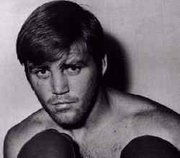Jerry Quarry
|
|
"Irish" Jerry Quarry (May 15, 1945 - January 3, 1999) was called by some the best heavyweight boxer to never win a world title. He was durable and smart, had a good punch, and owned a legendary chin. His one flaw was cuts, which stopped some of his fights and pestered him in others. Jerry had a good left hook, was a good body puncher, and a smart and quick counterpuncher. He was 6 ft 0 in (1.83 m) and weighed 195 lb (88 kg) in his prime.
Quarry come to national attention by winning the 1965 National Golden Gloves championship at Madison Square Garden. He knocked out each of his opponents in the tournament, a feat never before or since matched. Quarry began his pro career in 1965 winning a decision against Gene Hamilton in Los Angeles, California. He had fourteen fights that first year alone, with 13 wins and one draw. His first loss came against respected veteran Eddie Machen in 1966, Jerry's 21st fight at just 21 years of age. He followed that loss with a slew of victories and became a ranked heavyweight in 1967. That year the W.B.A. (World Boxing Association) had a tournament to replace Muhammad Ali, who had been stripped as champion. Quarry was named to the eight-man field and became its star. He defeated former world champion Floyd Patterson and tournament favorite Thad Spencer before an upset in the final by Jimmy Ellis. Still highly ranked, he was given a title shot by Joe Frazier in 1969. Quarry lost the fight via seventh-round technical knockout despite a tremendous performance. He would also fight Ali when the champion returned in 1970. Quarry did well enough to earn a rematch in 1972, but lost both fights. He also lost a rematch to Frazier in 1974. Still, Quarry maintained his high rank by defeating several top opponents from 1970 thru 1974. George Foreman refused to give Quarry a title shot and said in later years that he purposely dodged him.
Quarry was also a bit TV actor who appeared in several TV shows and would retire to work for the American Broadcasting Company in 1975. He earned over $5 million as a fighter without ever being champion - but several years later, the first signs of his downfall began to appear.
In 1983, while researching a magazine article about the health problems of retired boxers, a Sports Illustrated reporter visited Quarry, then 37 and training for a comeback attempt. Though the boxer appeared to be in good health, his performances on several simple cognitive tests were shockingly poor. This was the harbinger for the mental decline that destroyed the last part of his life - dementia pugilistica, the atrophy of the brain from repeated blows to the head, eventually leading to an Alzheimer's-like state.
His fortune depleted by 1992, Quarry, by then 47, signed up for yet another "comeback" bout at thederisively low prize money of $1,050 and took a ferocious pounding in what proved his last fight. Within a few years, he was unable to feed or dress himself and had to be cared for by relatives, mainly his brother James - the only one of the four Quarry brothers not to box professionally. (Jerry's brother, Mike, once fought for the light-heavyweight but himself was disabled by pugilistic dementia in later life. Another brother, Bobby, suffers from Parkinson's disease, believed to be the result of his own, less heralded heavyweight career.)
Quarry died in 1999. A foundation works in his honor to battle the condition that shortened his life.
Jerry Quarry was inducted to the World Boxing Hall of Fame in 1995. His pro record was 53-9-4 with 32 KOs. It includes wins over Floyd Patterson, Thad Spencer, Buster Mathis, Mac Foster, Ron Lyle, and Earnie Shavers, all notable heavyweights. His brothers Mike Quarry and Bobby Quarry are also former boxers. Mike once lost to Bob Foster by knockout for the world light heavyweight title in 1974. Bobby fought 23 times as a professional heavyweight.
External links
- Professional fighting record (http://www.boxrec.com/record009385.html)
- Jerry Quarry Foundation web site (http://www.jerryquarry.com)

